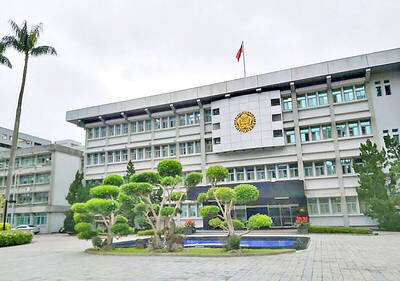Democratic Progressive Party (DPP) caucus whip Ker Chien-ming (柯建銘) on Sunday accused the opposition of “barbaric” obstruction, adding that failure to approve the general budget before the end of the year would have dire consequences.
The Chinese Nationalist Party (KMT) has been boycotting the general budget for next fiscal year in the six legislative committees which they convene, he said.
As a result, the legislature has little time left to vote on the budget before the session expires, Ker said.
Failure to pass the budget would affect a broad range of government programs, including public employee pay raises, long-term care, military procurement, drug-use prevention, higher-education reform and the purchase of new police uniforms, he said.
“It does not matter how barbaric you are: Boycotting the general budget is off-limits,” he said. “Our patience has limits.”
If the committees do not finish their reviews, the DPP caucus would withdraw the bills from committee and force their second readings through without further deliberation, he said, adding that should the DPP caucus decide on this course of action, party legislators are to either put it in motion on Friday or convene the legislature for an extra session.
What will happen depends on KMT members’ actions, he said.
The Legislative Yuan has eight standing committees, but only the Economics Committee and the Transportation Committee have finished deliberating their portions of the general budget, he said.
Deliberations are incomplete at the Social Welfare and Environmental Hygiene, Judiciary and Organic Laws and Statutes, Finance, Foreign Affairs and National Defense, Education and Culture, and Internal Administration committees, he said, adding that the delay is particularly severe in the Finance Committee.
Only some bills sponsored by DPP conveners, and the Aboriginal cultural budgets sponsored by KMT Legislator and Internal Administration Committee Convener Sra Kacaw (鄭天財) are ready, he said.
“The legislature has never in its 20 years failed to hammer out a general budget in committee by this time of the year,” Ker said, adding that public servants would receive no pay raise if the general budget is not passed.
The KMT should “own up” to opposing the raise if it obstructs the budget, he added.
“The delays to the general budget will have a negative effect on policy,” Cabinet spokesman Hsu Kuo-yung (徐國勇) said.
The Cabinet is hopeful that the budget will pass by next month, but any further delays would impede the schedules for infrastructure projects and other policies, he said, adding that the administration expects the general budget to pass immediately next month by an extempore legislative session, as the 3 percent pay raise for teachers, public functionaries and military personnel depends on the budget.
The KMT caucus yesterday sent a request to Legislative Speaker Su Jia-chyuan (蘇嘉全) to extend the session and include more party-to-party negotiations to ensure the government’s continued funding and implementation of major policies.
Additional reporting by Lin Liang-sheng

The German city of Hamburg on Oct. 14 named a bridge “Kaohsiung-Brucke” after the Taiwanese city of Kaohsiung. The footbridge, formerly known as F566, is to the east of the Speicherstadt, the world’s largest warehouse district, and connects the Dar-es-Salaam-Platz to the Brooktorpromenade near the Port of Hamburg on the Elbe River. Timo Fischer, a Free Democratic Party member of the Hamburg-Mitte District Assembly, in May last year proposed the name change with support from members of the Social Democratic Party and the Christian Democratic Union. Kaohsiung and Hamburg in 1999 inked a sister city agreement, but despite more than a quarter-century of

The Ministry of Foreign Affairs (MOFA) yesterday expressed “grave concerns” after Singaporean Prime Minister Lawrence Wong (黃循財) reiterated the city-state’s opposition to “Taiwanese independence” during a meeting with Chinese Premier Li Qiang (李強). In Singapore on Saturday, Wong and Li discussed cross-strait developments, the Singaporean Ministry of Foreign Affairs said in a statement. “Prime Minister Wong reiterated that Singapore has a clear and consistent ‘one China’ policy and is opposed to Taiwan independence,” it said. MOFA responded that it is an objective fact and a common understanding shared by many that the Republic of China (ROC) is an independent, sovereign nation, with world-leading

The Ministry of Justice Investigation Bureau (MJIB) has been investigating nine shell companies working with Prince Holding Group, and the Taipei District Prosecutors’ Office is seeking further prosecution of alleged criminals, a source said yesterday. The nine companies and three Taiwanese nationals were named by the US Department of the Treasury’s Office of Foreign Assets Control (OFAC) on Oct. 14 as Specially Designated Nationals as a result of a US federal court indictment. Prince Holding founder Chen Zhi (陳志) has been charged with fraud, conspiracy, money laundering and overseeing Prince Holding’s suspected forced-labor camps in Cambodia, the indictment says. Intelligence shared between Taiwan,

Temperatures in northern Taiwan are forecast to reach as high as 30°C today, as an ongoing northeasterly seasonal wind system weakens, the Central Weather Administration (CWA) said. CWA forecaster Tseng Chao-cheng (曾昭誠) said yesterday that with the seasonal wind system weakening, warmer easterly winds would boost the temperature today. Daytime temperatures in northern Taiwan and Yilan County are expected to range from 28°C to 30°C today, up about 3°C from yesterday, Tseng said. According to the CWA, temperature highs in central and southern Taiwan could stay stable. However, the weather is expected to turn cooler starting tonight as the northeasterly wind system strengthens again